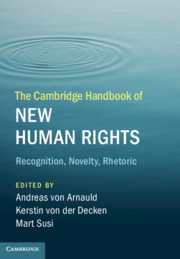Book contents
- The Cambridge Handbook of New Human Rights
- The Cambridge Handbook of New Human Rights
- Copyright page
- Contents
- Figures
- Contributors
- Acknowledgements
- Introduction
- Part I Cross-Cutting Observations
- 1 Recognition of New Human Rights
- 2 Novelty in New Human Rights
- 3 Rhetoric of Rights
- Part II Public Good Rights
- Part III Status Rights
- Part IV New Technology Rights
- Part V Autonomy and Integrity Rights
- Part VI Governance Rights
- Index
2 - Novelty in New Human Rights
The Decrease in Universality and Abstractness Thesis
from Part I - Cross-Cutting Observations
Published online by Cambridge University Press: 04 January 2020
- The Cambridge Handbook of New Human Rights
- The Cambridge Handbook of New Human Rights
- Copyright page
- Contents
- Figures
- Contributors
- Acknowledgements
- Introduction
- Part I Cross-Cutting Observations
- 1 Recognition of New Human Rights
- 2 Novelty in New Human Rights
- 3 Rhetoric of Rights
- Part II Public Good Rights
- Part III Status Rights
- Part IV New Technology Rights
- Part V Autonomy and Integrity Rights
- Part VI Governance Rights
- Index
Summary
The element of novelty in relation to new human rights has two main aspects – epistemic and ontic. The epistemic aspect is influenced by time and refers to the process of knowledge development and discursive practice from the introduction of the idea of a new human rights claim, usually reflecting a fundamentally important social value, until sometime after its regional or universal recognition either in human rights positive or soft law, or conversely, its rejection. The claim of ‘novelty’ starts before and ends after the recognition of a new human right in the family of so-called stand-alone human rights.
- Type
- Chapter
- Information
- The Cambridge Handbook of New Human RightsRecognition, Novelty, Rhetoric, pp. 21 - 33Publisher: Cambridge University PressPrint publication year: 2020
- 7
- Cited by



